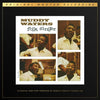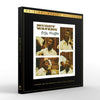



Muddy Waters - Folk Singer (2LP, 45RPM, Box set, 1STEP, SuperVinyl)
ORDER LIMITED TO ONE ITEM PER CUSTOMER
Muddy Waters – guitar, vocals [click here to see more vinyl featuring Muddy Waters]
Buddy Guy – guitar [click here to see more vinyl featuring Buddy Guy]
Sammy Lawhorn – guitar
James Madison – guitar
Otis Spann – harmonica, piano [click here to see more vinyl featuring Otis Spann]
Francis Clay – drums
Clifton James – drums
S.P. Leary – drums
Willie Dixon – bass
Milton Rector – bass
J.T. Brown – clarinet, tenor saxophone
2 LPs, box set
Limited to 10,000 numbered copies
Original analog Master tape : YES
UltraDisc One-Step (UDS1)
Heavy Press : 180g SuperVinyl
Record color : black
Speed : 45 RPM
Size : 12'’
Stereo
Studio
Record Press : RTI
Label : MOFI
Original Label : Chess
Recorded at Ter Mar Recording Studios in September, 1963
Engineered & mixed by Ron Malo
Produced by Ralph Bass, Willie Dixon
Originally released in 1964
Reissued in March 2022
Tracks:
Side A:
- My Home Is In The Delta
- Long Distance
Side B:
- My Captain
- Good Morning School Girl
- You Gonna Need My Help
Side C:
- Cold Weather Blues
- Big Leg Woman
Side D:
- Country Boy
- Feel Like Going Home
Awards :
Rolling Stone 500 Greatest Albums of All Time - ranked 280
Reviews:
"Muddy Waters was born on April 4, 1913 and died on April 30, 1983. The 35th anniversary of his passing has recently come and gone. (...)
The fifties will always have the bragging rights of being the "golden era" of rock n' roll. But the sixties? Not so much. During the first half, Jerry Lee's great balls of fire had already burned, The King's hound dogs had howled, Johnny had been good (but Chuck the Duck Walker was caught being bad). Yes, Chubby Checker had twisted his way over Fats Domino's blueberry hill, but American teens hadn't yet started to twist and shout, had they?
In a gritty neighborhood on the South Side of Chicago sat a small legendary studio that ultimately became a powerhouse as the years went passing by. Chess Records was owned and operated by Phil and Leonard Chess, who bought the building and hired a few key people to run the recording studio and its offices. They also hired some of the greatest blues musicians in the world to make the music. Among them were three kings: Muddy Waters, Willie Dixon, and Buddy Guy. In this early part of 1963, these three gentlemen, along with Chess session drummer Clifton James (the originator of the Bo Diddley drum beat, did you know?) came together to do a special recording for the Chess label. It would be captured in a different manner than the usual approach, and there were reasons for it to be done this way.
By now, the once-plentiful and thriving urban Chicago blues scene was slowly dying on the vine in the black community; several live venues were losing steam and money too; even Muddy's main sidekick, guitarist Jimmy Rogers, had thrown in the towel as early as 1960 and said "I'm retired." His departure from the Chicago clubs lasted throughout the decade, 'til the next one started.
Some of Muddy's biggest Chess pieces had been already recorded between 1950-1960. But things had changed by 1963 when Waters, Dixon, Guy, and James came together for this seminal event, which took place shortly before the 1963 American Folk Blues Festival, an event which, in hindsight, may have very well been the impetus for bringing this session to fruition. Indeed, Muddy Waters was scheduled to perform as one of the main acts on the star-studded blues extravaganza. Based on well-documented itinerary notes from music historian Stefan Wirz, Muddy most likely made his overseas departure in the last week of September to arrive in time for the beginning of the Blues Festival tour in Frankfurt, Germany on September 24th.
Chess producer Ralph Bass, who wrote liner notes for the music that would become Folk Singer, mentions that the folk craze was taking over the country. He wasn't exaggerating—during this early part of decade in American music, it was all about the emergence of artists like Pete Seeger, The Kingston Trio, Odetta, Joan Baez, Peter, Paul & Mary, and a young Bob Dylan among others. But then it became more real when a few music researchers (Dick Waterman, Phil Spero and Nick Perls) went south and found the originators of Mississippi Delta music who were still alive and well, gradually coaxing them out of the shadows and back into the light. Son House, Sleepy John Estes, Skip James, Mississippi Fred McDowell, and some others were now suddenly all the rage, as if being raised from the dead—only they weren't dead, hadn't died. But now white college kids were rediscovering black artists—the originators of the art form—who fueled the folk blues revival across the country…
The Chess Brothers wanted part of that action. Certainly, their franchise was trying to capitalize on the folk movement. What they didn't seem to realize was that they had it all along. Hell, Big Bill Broonzy—the epitome of rural southern black folk music—had lived right there in Chicago, and it was no secret that he was one of the two biggest influences on Muddy's early evolution (the other being Son House). Truth of the matter is, all the best Chess stuff was already folk blues—'The REAL Folk Blues,' as Phil & Leonard eventually began labeling some of these LPs they released on Muddy, Howlin' Wolf, Sonny Boy Williamson and John Lee Hooker. Muddy's Folk Singer project was the first of them." Wayne Goins, Positive Feedback, June 2018
“Muddy's "unplugged" album was cut in September of 1963 and still sounds fresh and vital today. It was Muddy simply returning to his original style on a plain acoustic guitar in a well-tuned room with Willie Dixon on string bass, Clifton James on drums, and Buddy Guy on second acoustic guitar. The nine tracks are divided up between full rhythm section treatments with Buddy and Muddy as a duo and the final track, "Feel Like Going Home," which Waters approaches solo.” AllMusic Review by Cub Koda
UltraDisc One-Step : Instead of utilizing the industry-standard three-step lacquer process, Mobile Fidelity Sound Lab's new UltraDisc One-Step (UD1S) uses only one step, bypassing two processes of generational loss. While three-step processing is designed for optimum yield and efficiency, UD1S is created for the ultimate in sound quality. Just as Mobile Fidelity pioneered the UHQR (Ultra High-Quality Record) with JVC in the 1980s, UD1S again represents another state-of-the-art advance in the record-manufacturing process. MFSL engineers begin with the original master tapes and meticulously cut a set of lacquers. These lacquers are used to create a very fragile, pristine UD1S stamper called a "convert." Delicate "converts" are then formed into the actual record stampers, producing a final product that literally and figuratively brings you closer to the music. By skipping the additional steps of pulling another positive and an additional negative, as done in the three-step process used in standard pressings, UD1S produces a final LP with the lowest noise floor possible today. The removal of the additional two steps of generational loss in the plating process reveals tremendous amounts of extra musical detail and dynamics, which are otherwise lost due to the standard copying process. The exclusive nature of these very limited pressings guarantees that every UD1S pressing serves as an immaculate replica of the lacquer sourced directly from the original master tape. Every conceivable aspect of vinyl production is optimized to produce the most perfect record album available today.
MoFi SuperVinyl: The World's Quietest Surfaces and Cleanest Grooves: Developed by NEOTECH and RTI, MoFi SuperVinyl is the most exacting-to-specification vinyl compound ever created. Analog lovers have never seen (or heard) anything like it. Extraordinarily expensive and extremely painstaking to produce, the special proprietary compound addresses two specific areas of improvement: noise floor reduction and enhanced groove definition. The vinyl composition features a new carbonless dye (hold the disc up to the light and see) and produces the world's quietest surfaces. This high-definition formula also allows for the creation of cleaner grooves that are indistinguishable from the original lacquer. MoFi SuperVinyl provides the closest approximation of what the label's engineers hear in the mastering lab.
Ratings :
AllMusic : 4,5 / 5 , Discogs : 4,66 / 5







